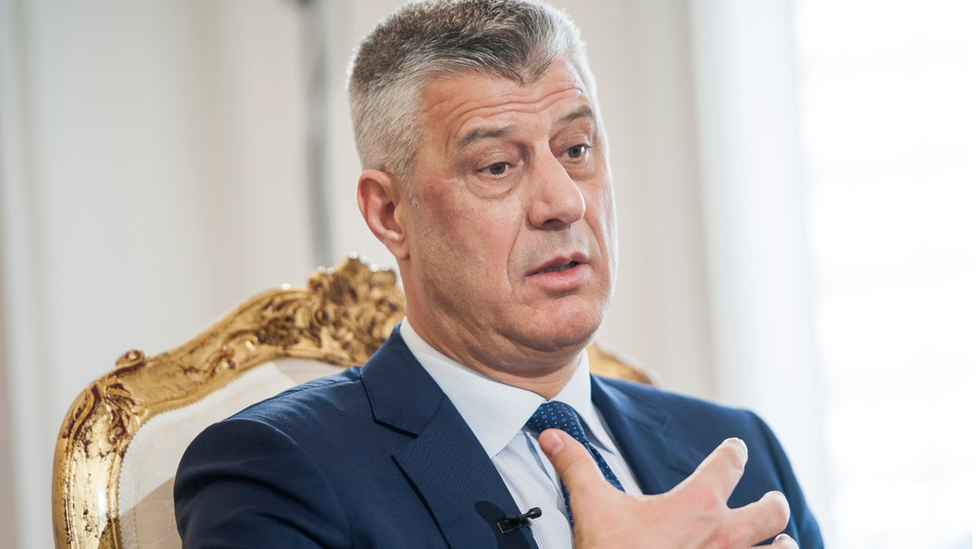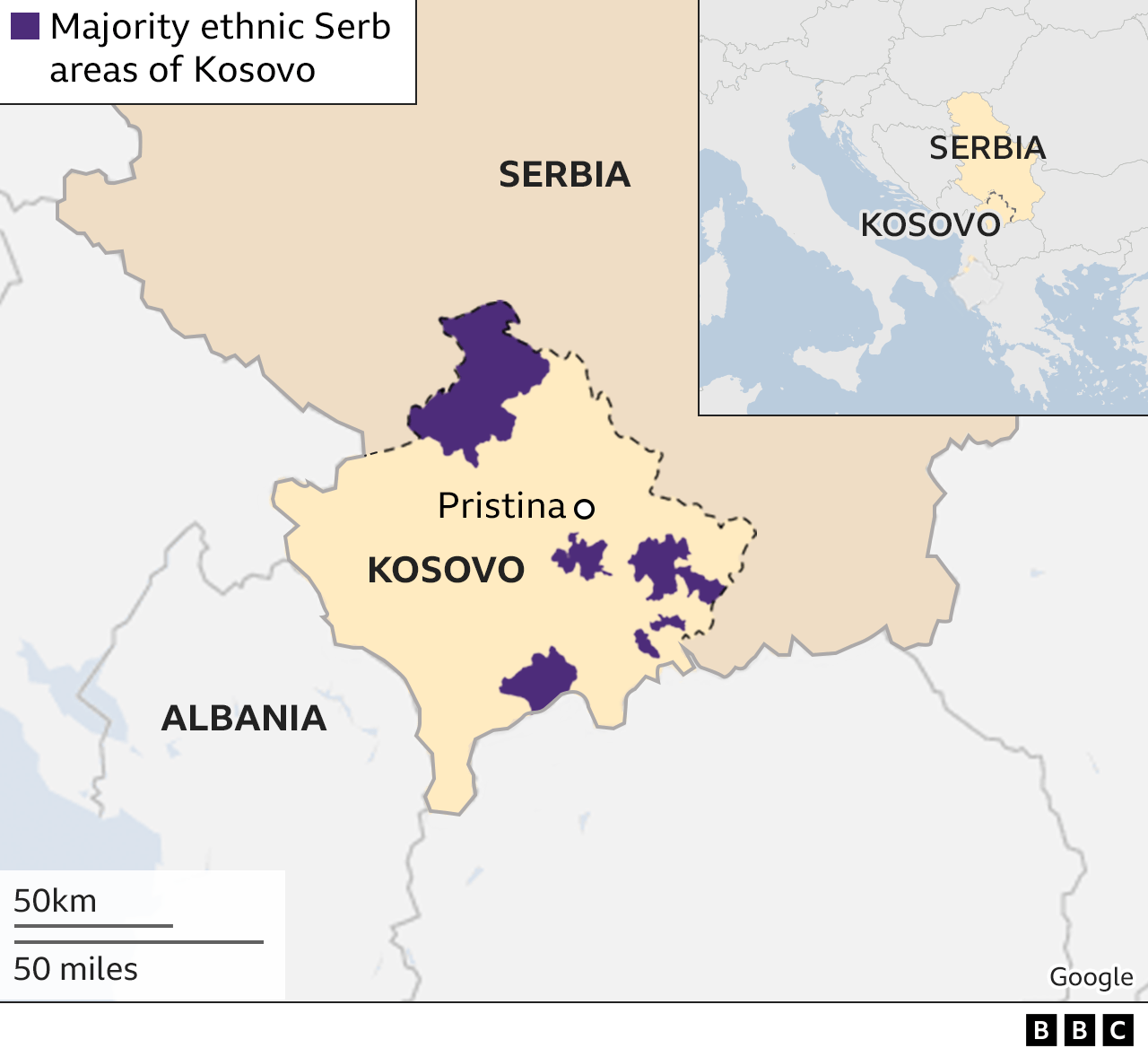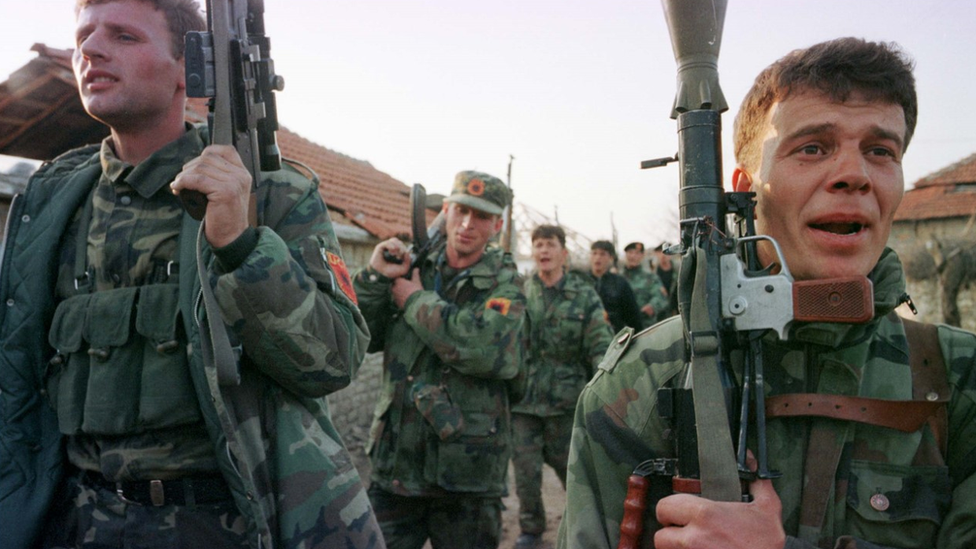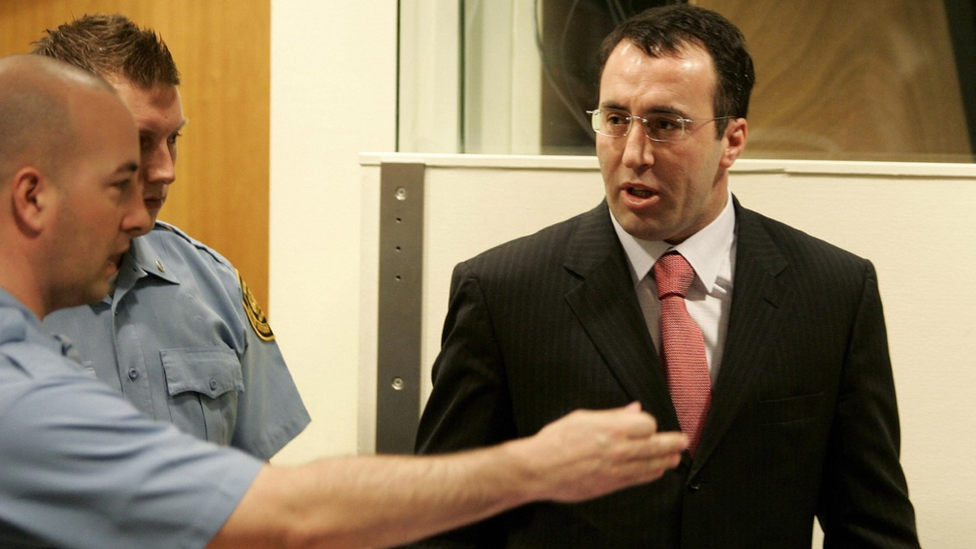What was the Kosovo Liberation Army and why are its leaders on trial?
- Published

A former president of Kosovo has gone on trial in The Hague along with three other ex-leaders of the Kosovo Liberation Army.
Hashim Thaçi stood down from office in November 2020 to face charges of crimes against humanity allegedly committed during and after Kosovo's war with Serbia, in 1998 and 1999.
Where is Kosovo?
Kosovo is in the Balkans, bordering Albania, North Macedonia, Montenegro and Serbia.
Many Serbs consider it the birthplace of their nation.
But today, more than 90% of the 1.8 million people living there are ethnic Albanians. , external

Kosovo used to be a self-governing province of Serbia - which itself was part of the former Yugoslavia.
However, in 1989, Serbian President Slobodan Milosevic stripped it of that status.
This sparked a movement amongst ethnic Albanians to make Kosovo a completely independent nation.
In 1998 and 1999, the Kosovo Liberation Army (KLA) fought Serbian forces in an all-out war.
An international consortium tried to establish peace. The Kosovan delegation signed a peace treaty, but the Serbian side refused.
After 11 weeks of Nato air strikes, Serbian forces left Kosovo in 1999.
In 2008, Kosovo unilaterally declared independence.
Ninety nine of the UN's 193 member states recognise it as a country in its own right. Serbia does not.
What was the Kosovo Liberation Army?
The KLA was a militant group of ethnic Albanians in Kosovo, set up in the early 1990s.
From 1996, its members carried out attacks on Serbian police stations and other targets.
Serbian forces responded by cracking down on Kosovo's ethnic Albanian population, raiding villages and expelling people from their homes.

Members of the KLA fought a war against Serb forces in 1998 and 1999
During the war of 1998-1999, and immediately after it ended, members of the KLA are alleged to have targeted ethnic Serbs, and others, including fellow Albanians they considered to be opponents or collaborators.
The crimes they are charged with include persecution, imprisonment, abduction, torture and murder.
According to the court's indictment, these crimes took place in more than 100 locations in Kosovo and in northern Albania, external, where Serb civilians were allegedly detained and mistreated or murdered.
However, it is hard to say that any crimes committed by rank-and-file members of the KLA were ordered by its senior officers, says Tim Judah, The Economist's Balkans correspondent.
"The KLA emerged very fast, and its command was very unfocused. It is difficult to define what the chain of command was," he says.
Who is Hashim Thaçi?
An ethnic Albanian, Hashim Thaçi was one of the founders of the KLA.
In July 1997, a Serbian-run court in Kosovo sentenced him in absentia to 10 years in prison for "criminal acts of terrorism".
However, according to Mr Judah, "Hashim Thaçi wasn't a military commander. He gave the KLA its political direction."
On January 9, 2008, Mr Thaçi was elected prime minister of Kosovo, and in 2016, he was elected president.
In 2020 a special tribunal in The Netherlands indicted him for war crimes and crimes against humanity. He resigned the presidency to face trial, and has been detained in The Hague ever since.
How will the trial work?
The trial is being held in a temporary court called the Kosovo Specialist Chambers in The Hague, which was set up under an agreement between the EU and Kosovo's parliament, known as the Kosovo Assembly.
It is staffed by international judges and lawyers.
The court was established in 2015 after EU investigators gathered fresh evidence of war crimes allegedly committed by KLA commanders, and filed indictments against them.
Hashim Thaçi is being tried alongside the former speaker of Kosovo's parliament Kadri Veseli, former KLA spokesman Jakup Krasniqi and former KLA commander Rexhep Selimi.
All four men have pleaded not guilty.
In December 2022, the Kosovo Specialist Chambers convicted the KLA commander Salih Mustafa, external, who ran a prison during the war where torture took place.
He was sentenced to 26 years in prison but has launched an appeal.
In 2009, three former members of the KLA were found guilty in a Kosovo court of torturing prisoners in a camp, and were sentenced for between three and six years.

Former Kosovan prime minister Ramush Haradinaj was twice tried for war crimes at The Hague, and twice acquiitted.
Another court at The Hague - the International Criminal Tribunal for the former Yugoslavia - held two trials of KLA commander and Kosovan Prime Minister Ramush Haradinaj in the years between 2007 and 2012.
He was acquitted both times.
How will the trials be seen in Kosovo and Serbia?
The trials are likely to be divisive in Kosovo and Serbia, where ethnic tensions persist.
"The Serbs have always seen the KLA as a terrorist organisation," according to Prof Rachel Kerr from Kings College London.
"However, ethnic Albanians are upset about these trials because they feel they were the victims of Serbian aggression, and they think they had right on their side."